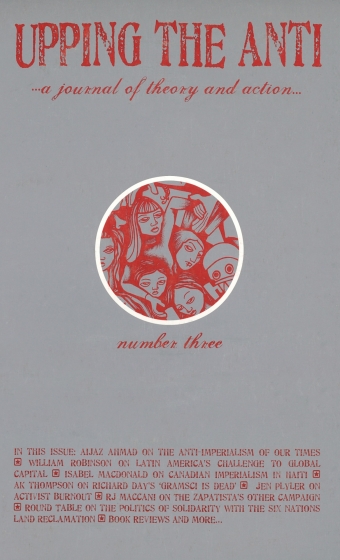A Reply to Kersplebedeb
Dear Readers,
For the record, I did read Sakai’s Settlers: Mythology of the White Proletariat in full. I have also read the interview with Sakai put out by Karl Kersplebedeb. Both texts are readable and interesting, although no work can be complete. In the interview, however, I see Sakai speaking with a greater degree of nuance while maintaining the core thesis of Settlers. Perhaps Sakai was addressing what he perceived as a common misreading of his initial work, though I really can’t say.
As Kersplebedeb points out, accessible language is important. Admittedly, my writing – and perhaps the journal itself – are not always exemplars of accessibility. But beyond his comments on style, it is worth exploring some substantive critiques Kersplebedeb presents.
I will begin with the big picture. A basic understanding of the overall picture – a critique of capitalism, racial subjugation, patriarchy, imperialism and colonialism – is vital. Kersplebedeb mistakenly attributes to me a desire to abolish categories such as race and class. But to ignore race and class as they continue to structure human experience would be sheer folly. It is fundamental to understand how nationality, race, class, gender, religion, and sexuality structure the world, and I desire not to disregard these structures, but to draw heightened attention to their complexity.
It is because of such complexities that a generalized schema cannot be our complete roadmap to engagement; this is particularly so if our atlas does not attempt to integrate race, class and gender. This is a world of pointed engagements in nuanced situations. The larger picture is simply an aggregation of these multiple points where power is articulated and contested. As Kersplebedeb elucidates in his conclusion, we must seek to understand our piece in the jigsaw puzzle. We need to build situational understandings for situational engagements within the framework of larger struggles for liberation. Che Guevara’s misadventures in the Congo and Bolivia provide but one of the many examples of the incapacitating effects of ignoring local context.
I continue to believe that an understanding of agency – something Kersplebedeb dismisses as inevitably leading to the total disregard of class analysis – is vital. I really struggle to fathom how this could be superfluous and detrimental to our theorizing. Kersplebedeb suggests that contemplating agency results in the “prompt disregard” of class analysis. Agency is what we seek to understand within the dynamics of power and resistance, and ultimately of change. Sakai does present a sobering scene of a white America unable to transcend its racial privilege to fight for common liberation – he repeatedly expresses the inherently bourgeois positioning of whiteness. I think understanding both the material and symbolic orientation of people is fundamental to theorizing change. Sakai correctly chastises overly simplified assumptions of common interest between racially marginalized peoples and the white working class. However, I still believe that we need a more thorough accounting of the operation of racial as well as gender ideologies than Sakai provides for us. And I fear where interpretations of whiteness as irreconcilably allied to power may lead us tactically.
I dislike the propensity of the idea of whiteness as inescapably bourgeois to result in eschewing the possibility of working with white folks. There are times where working with whites is tactically useful, and where common interests can be found. We should not disregard this possibility out of hand. That said, Sakai meaningfully points to the problem of constantly moderating the goals of people of colour to white interests. This is a tendency to be wary of, and marginalized communities must continue to organize autonomously to build movements around their interests.
One of the ways that many of these communities organize is around national identity. However, it would be overly reductive to proclaim that national struggles are necessarily to the benefit of the nation, as even marginalized or internally colonized nations are composed of diverse interests. Kersplebedeb’s articulation of nationality as the weapon, shelter, and also trap of the marginalized conveys some of this complexity. However, I fail to ?understand how we are to engage with these complexities if not through a nuanced approach. How do we differentiate the sites of entrapment from empowerment in a generalized schema?
Our reality is not a unified battle for liberation, but rather a multitude of interrelated struggles. We simply cannot assume that movements for national liberation are anti-capitalist, just as we must be aware of patriarchal currents within many movements. As Kersplebedeb concludes, we must be critical of the ways nation, race, class, and gender intersect. Even as we address the environment, we must also engage with race, class, and gender, for in reality these social relations are always present. My primary problem was not so much Sakai’s engagement with the national question, but his presumption of clear boundaries. This does not mean we cannot engage, but that we need to be critical of who’s represented and who’s forgotten. As oppression emerges from multiple sources, our resistance (and all too often, unfortunately, our collaboration) likewise takes diverse forms.
As one example, Sunera Thobani has recently raised the question of the tensions between the struggles of unrecognized immigrants and Aboriginal peoples. The fight for immigrant rights is ultimately a fight for inclusion within Canadian citizenry. However, Canadian citizenship is built upon the systematic denial of Aboriginal rights and title. Thobani asks, how does one fight for inclusion in Canada as a citizen without re-trenching the denial of Aboriginal peoples inherent to that citizenship?
These are difficult and complicated questions. To account for such complexities, I continue to believe in the necessity of integrated understandings, of autonomous organizing in different communities, and of building solidarity between different struggles.
In Solidarity,
Tyler McCreary

